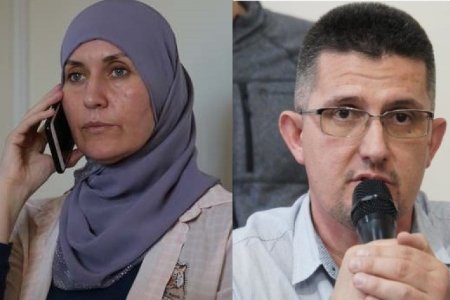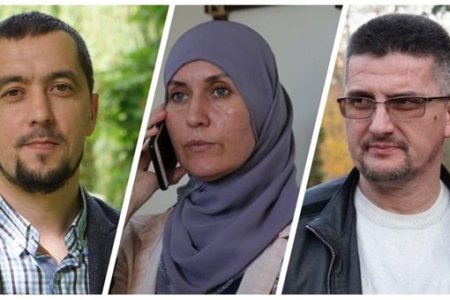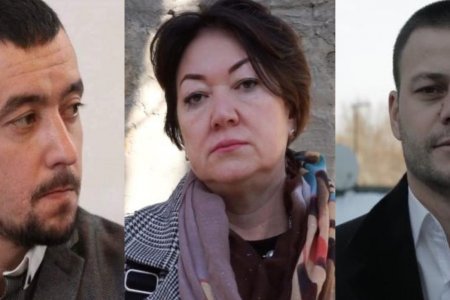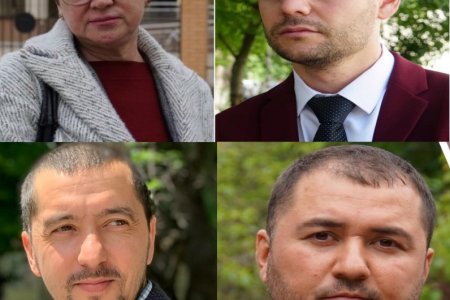
In Russia’s latest attack on two Crimean Tatar human rights lawyers, occupation ‘police’ have carried out a search of the home of Rustem Kyamilev and Lilia Hemedzhy, and fabricated absurd grounds for prosecuting and jailing Kyamilev over two Facebook posts from 2017 and 2020.
Officers from Russia’s so-called ‘centre for countering extremism’ turned up at the couple’s home in the morning of 7 November, with a warrant to carry out an ‘inspection’ issued by the occupation ‘Kievsky district court’. ‘Inspections’ are, in formal terms, not searches. In practice, the distinction simply facilitates paperwork requirements where there are no grounds for a search. The lack of any grounds or resistance shown did not stop these Russian occupation officers from forcing Kyamilev to the ground. That this was part of Russia’s systematic attack on lawyers defending victims of political persecution was further confirmed by the participation in the raid of Ruslan Shambazov, the notorious traitor behind a huge number of politically motivated prosecutions in occupied Crimea.
After this supposed ‘inspection’, during which even their 21-year-old daughter’s phone was removed, as well as documents clearly linked with the couple’s work and status as lawyers, the officers took Kyamilev away to the Simferopol ‘Centre’ office. There it became clear that they had come up with two administrative prosecutions over very old Facebook posts.
The first charge was under Article 20.3 § 1 of Russia’s administrative code, which purportedly punishes for the ‘propaganda or public demonstration’ of, among other things, the symbols of extremist organizations, or of symbols banned by ‘federal laws’.
The charge was over a repost in 2020 from the Crimean Solidarity human rights initiative about the politically motivated trial of Oleh Prykhodko (b. 1958), the Ukrainian activist and recognized political prisoner now serving a 9.5-year sentence for his opposition to Russian occupation. The excuse for the prosecution was the image that Prykhodko was holding, showing the Ukrainian trident. The ‘Centre’ claimed, and a ‘judge’ from the Russian-controlled ‘Kievsky district court’ chose to accept, that this was the symbol of Right Sector, a Ukrainian nationalist organization that Russia banned in 2014.
On the basis of this inaccurate claim about a reposted photo of Prykhodko from 2020 Kyamilev was jailed for ten days.
The second charge was under Article 20.3.3 § 1 of the same code, one of the four administrative and criminal charges rushed into law after Russia’s full-scale invasion of Ukraine. It claims to penalize for ‘discrediting’ the Russian armed forces and other involved in its war of aggression against Ukraine, although the vast majority of prosecutions are for expressing pro-Ukrainian and / or anti-war views. In this case, the charge was over a repost from 2017 of a comment, seemingly from Russian opposition politician Grigory Yavlinsky. This was a video and comment about events in Syria and Ukraine, saying that “this is an ethical catastrophe for Russia which will not be forgotten for a decade, perhaps a century.”
The same occupation ‘court’ imposed a fine of 50 thousand roubles over the 2017 repost.
Lilia Hemedzhy reports that the search was carried out with shocking infringements. She is convinced that the real aim of all the repressive measures on 7 November was to gain control of the couple’s technical devices and legal documentation, most of which concerns their defence of political prisoners. She also mentioned chilling details of Shambazov’s menacing questions to the couple’s son, with these making her suspect that he may encounter difficulties in taking his university exams. This would not be the first time that the Russian enforcement bodies in occupied Crimea have extended their measures of persecution to political prisoners’ children.
Russia began waging a major offensive against various independent lawyers who insist on providing proper legal assistance to victims of its persecution in 2017. Various measures have been applied, including grotesque charges like those against Kyamilev and measures to strip lawyers of their licence to practise.
The attack on Lilia Hemedzhy, Rustem Kyamilev and their colleague Nazim Sheikhmambetov began in August 2022, with Hemedzhy and Kyamilev formally disbarred in April 2023.
See: Lawyers on Russian FSB hitlist for defending Crimean Tatar political prisoners



